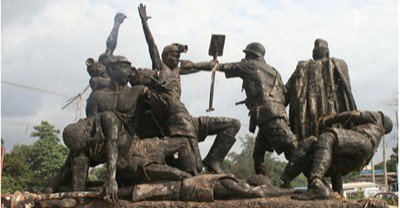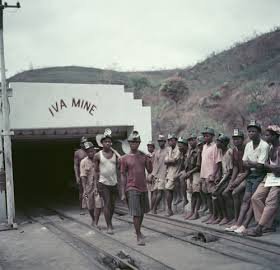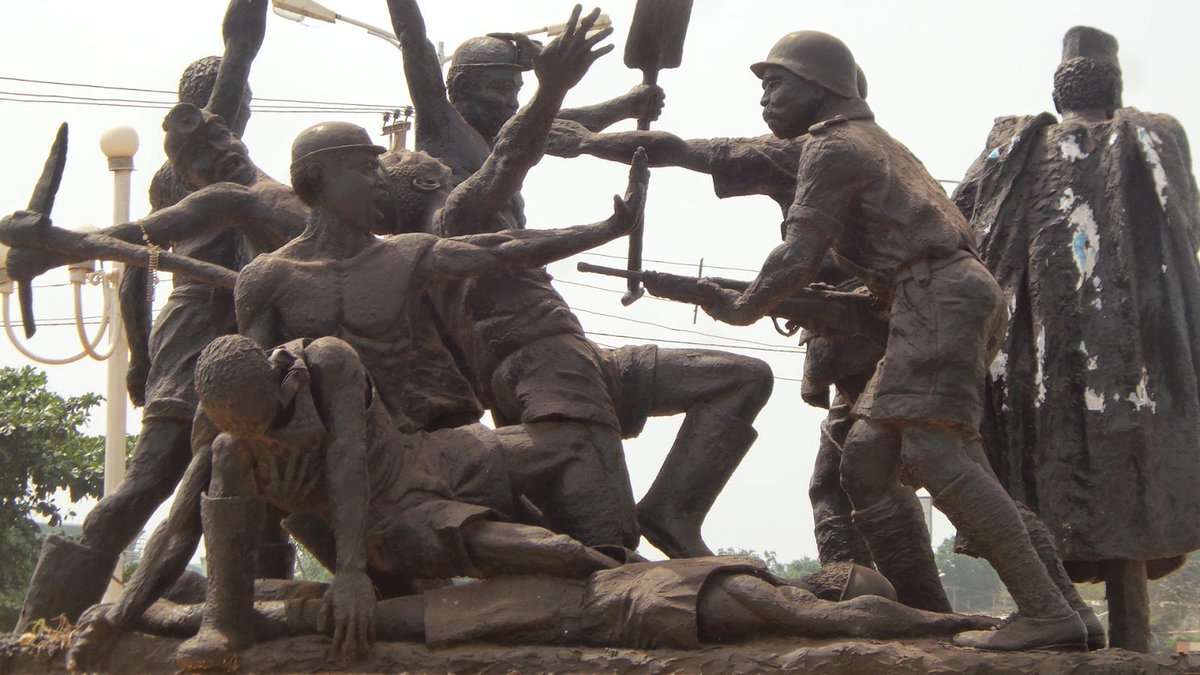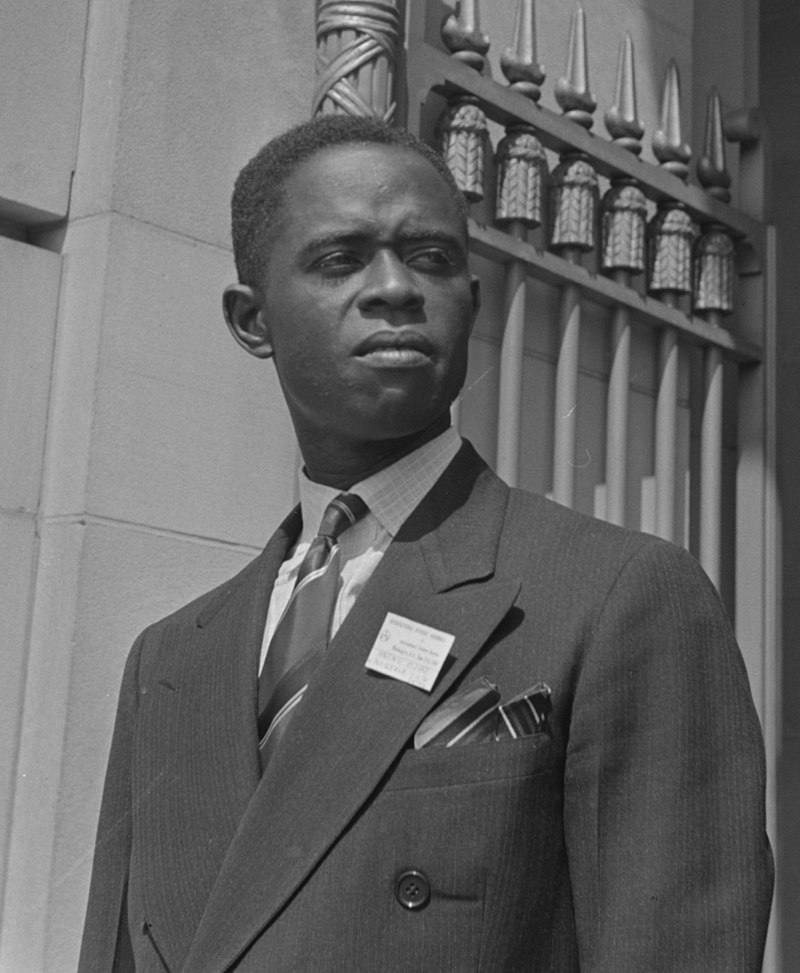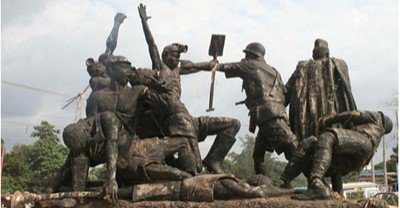Today in History:
Enugu Coal Miners Massacre took place
On this day, November 18, 1949, a sad event took place in Enugu. A day when 21 Iva Valley Coal Miners were killed and 51 injured by the police
What was their crime? It's a thread...
Retweet to educate someone on your TL
Enugu Coal Miners Massacre took place
On this day, November 18, 1949, a sad event took place in Enugu. A day when 21 Iva Valley Coal Miners were killed and 51 injured by the police
What was their crime? It's a thread...
Retweet to educate someone on your TL
under the brutish British colonial masters.
Their only crime was that they demanded for a "Better Pay". Iva Valley miners had dared protest against the colonial authorities. This was wrongly interpreted as a political strike to force them to quit Nigeria and allow them to join
Their only crime was that they demanded for a "Better Pay". Iva Valley miners had dared protest against the colonial authorities. This was wrongly interpreted as a political strike to force them to quit Nigeria and allow them to join
other independent nations of the free world.
Their sacrifice would be one of many that paved the way for a nationalist or "Zikist" (named after Dr. Nnamdi Azikiwe) movement towards an independent Nigeria. As at that time Zikist movement was headquartered in Enugu.
Their sacrifice would be one of many that paved the way for a nationalist or "Zikist" (named after Dr. Nnamdi Azikiwe) movement towards an independent Nigeria. As at that time Zikist movement was headquartered in Enugu.
No previous event ever evoked a manifestation of national consciousness comparable to the indignation generated by this tragedy, "the Enugu Coal Miners/Iva Valley Massacre", who were simply demanding for a better pay in commensurate with the amount of time worked.
The Iva valley coal mine, which took its name from the Iva Valley in which it is stationed, is situated near Enugu metropolis, present-day Enugu state, South-Eastern Nigeria, which was opened in 1917 to replace the Udi coal mine which had been shot down.
Created at the height of industrialization in eastern Nigeria, the demand for coal was high due to the Nigeria railway corporation being the highest consumer of coal in the country at that time.
There were cases of racism and physical assault meted out to Nigerians by the British managers, (Britain emeka anyị ife!).
An example of such was when Mr. Y. Yates, a British national on September 2, 1945 assaulted a worker, Mr. Okwudili Ojiyi.
An example of such was when Mr. Y. Yates, a British national on September 2, 1945 assaulted a worker, Mr. Okwudili Ojiyi.
The victim, Mazi Okwudili Ojiyi took courage and brought up an assault case and Mr. Yates (the British man) was prosecuted and penalized.
Everything boiled over when on 1st November 1949, the management rejected the demands for the payment of rostering, the upgrading of the mine hewers to artisans and the payment of housing and traveling allowances. Having no other alternative the workers began their strike.
The reaction of the British managers was to sack the coal miners, over 50 of them. They feared that the strike was part of the ever growing agitation for independence, so on 18th November 1949, they decided to remove the explosives that were within the mines.
The explosives of the sister Obwetti mine were easily removed but those of Iva valley were not because the workers refused to assist the management to do so.
The Fitzgerald commission, a directive that the colonialists were forced to set up to investigate the massacre, found that the motive behind why the miners objected to the removal of the explosives was because they were afraid that once the explosives were removed.
Nothing stood in the way of the management closing the mine and putting them out of the much needed work.
The senior superintendent of police at that time, Mr. F.S Phillip came to the mine, together with two other officers and seventy five armed policemen to remove the explosives, but a struggle ensued between three of the policemen and the workers.
At this point, Mr. Philip, without second thoughts and hesitation, ordered his men to open fire on the defenceless coal miners, killed 21 miners on the spot.
The tragedy sparked a butterfly effect on places like Onitsha, Aba and Port Harcourt resulting in mass protest and eighteen prominent Nigerians created the National Emergency Committee (NEC) to coordinate a national response to this atrocity against humanity.
It was presided over Dr. Akinola Maja with Mazi Mbonu Ojike (the man @cchukudebelu DP) as the secretary.
The colonial government of course lied that the coal miners had been armed, had tried to disarm and also attempted to seize the explosives for themselves. The commission of
The colonial government of course lied that the coal miners had been armed, had tried to disarm and also attempted to seize the explosives for themselves. The commission of
course saw through this falsehood.
The Commission observed and stated that:
"Not one policeman was injured, not one missile was thrown at them, (and that) if the crowd was bent on using force against the police nothing could have saved these policemen from grave injury".
The Commission observed and stated that:
"Not one policeman was injured, not one missile was thrown at them, (and that) if the crowd was bent on using force against the police nothing could have saved these policemen from grave injury".
Whereas for the fact they were not injured at all.
Today at New Market Roundabout Enugu, an everlasting monument can still be seen as a mark of respect for the brave Igbo men who were brave enough to stand against British tyranny and to show they live in our hearts forever.
Today at New Market Roundabout Enugu, an everlasting monument can still be seen as a mark of respect for the brave Igbo men who were brave enough to stand against British tyranny and to show they live in our hearts forever.
As we mark today, 71 years remembrance of 21 Igbo Civilians Coal Miners callously killed by the brutish British Police officers for demanding for a pay rise, we say may they keep resting in peace. Forever in our hearts. The END.
©Igbo History And Facts
@threadreaderapp unroll
©Igbo History And Facts
@threadreaderapp unroll

 Read on Twitter
Read on Twitter